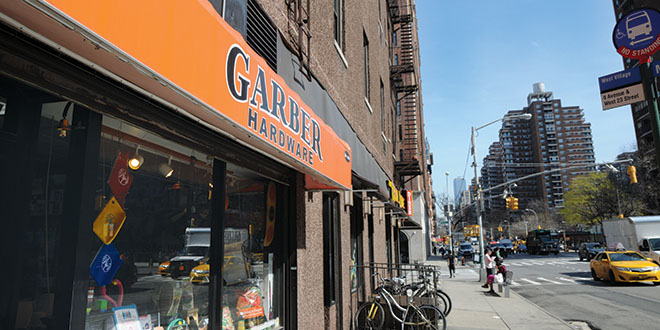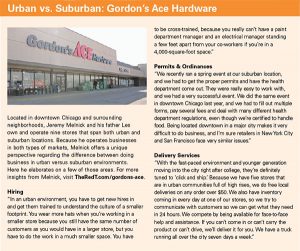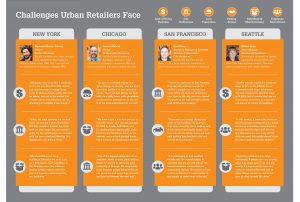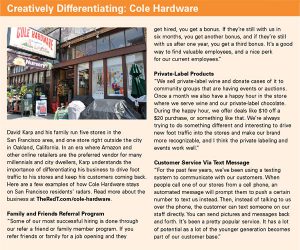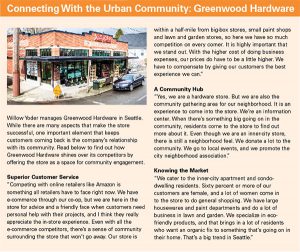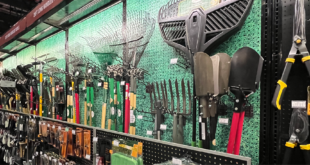To view a PDF of this story, click here.
People typically have opinions about whether they could “make it” in a city like New York or San Francisco. “I would love living in such a busy place! There’s always something new to see and people to meet,” some say. Or, others say, “That sounds terrible. It’s so noisy and crowded, and the traffic is awful!”
Whether city living is your ultimate plan or your worst nightmare, there is one thing that everyone can probably agree on.
Running a retail store in an urban environment creates unique challenges—and requires unique operations practices—that are all just part of the cost of doing business in the city.
Hardware Retailing spoke to four retailers in different cities across the United States to find out how they address challenges that are unique to each of their urban spaces, such as maintaining margins despite high operating costs, merchandising a small salesfloor, determining the best product mix for urban dwellers and more.
While the settings certainly differ, we discovered that urban retailers’ primary goals don’t differ much from their independent counterparts in suburban and rural areas. Urban retailers strive to provide expert customer service to their neighbors, even if there are 7 million of them. Retailers everywhere have an opportunity to learn from these urban operators who run their stores differently out of necessity.
18 Blocks Apart
When Nathaniel Garber Schoen was looking to open a second store in Manhattan, he prioritized proximity to his original hardware store so he could easily move between the two locations.
The space he chose is in Chelsea, less than a mile from the original store. Retailers in suburban or rural areas would probably never consider opening a second location so close to their primary store, but for some of Garber Hardware’s customers, the stores are a little too far apart.
“If we don’t have something in stock here, or if we don’t carry it, I tell them we have it at the Greenwich Village store, and instead they say ‘Can you have it sent here and I’ll come back to get it?’” Schoen says.
The stores are located in two distinct Manhattan neighborhoods—the primary location has been in Greenwich Village since 1884, moving only once in 2003—so the customer bases don’t overlap, which was another one of Schoen’s considerations in opening a second location.
“The neighborhood needed a hardware store, and this shop is conveniently located, compared to the original store, but it’s not so close that I would be poaching my own customers between the two locations,” he says.
Maintaining a Reputation
Garber Hardware’s Chelsea location, which Schoen operates full-time, opened in August 2016. His father, uncle and cousin run the original location in Greenwich Village.
“I’m fortunate that I live pretty much equidistant between the two stores,” says Schoen. “Over two or three zip codes in Manhattan, I feel like I know everybody, and they recognize me and my dog.”
Because the primary location has been in Greenwich Village for more than 130 years, Garber Hardware is well established and known throughout New York City as a place to find expert advice for home improvement projects.
“Every year that goes by, this business becomes more and more unique,” says Schoen, who is the fifth-generation owner of Garber Hardware. “I don’t know that there are any businesses in the city that are as old as we are that are still owned and operated by the original family.”
The age of New York City’s infrastructure is something that contributes to customer needs. Many people find themselves at Garber Hardware for answers when they get stuck on certain home improvement or renovation projects. The old architecture in Manhattan sometimes stumps professionals who have trouble visualizing a project through an awkward floorplan or need to figure out how to plumb a new bathroom when there is one tap for the whole apartment, says Schoen.
“In New York, every renovation situation is unique because all the spaces are abnormal,” he says. “The things we sell aren’t manufactured with urban dwellers in mind, so it doesn’t necessarily apply out of the box. There are a lot of larger workarounds that people need to do.”
Schoen says even simple projects like window insulation are something New Yorkers need to find an alternative solution for, because windows in older townhomes can be odd dimensions that don’t match a standard box of window insulation. For these customers, Schoen recommends they buy insulation made for patio doors and have it cut to fit.
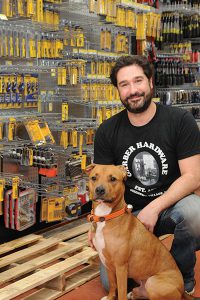
“I have licensed professionals who know what they’re doing, and they’ll still come in and spend 20 minutes just brainstorming what particular issues they have at hand,” says Schoen. “They’re so thankful for the help, because this could be a $10,000 install, and they’re stuck.”
This in-the-weeds customer service sets Garber Hardware apart from others, Schoen says. “A client might come to us with a problem, and we might have already solved it for three or four other people. As soon as I get a little more information, I can offer a solution.”
In addition to DIY customers and renovation professionals, Garber Hardware meets the unique needs of customers who work on film, television and stage productions and in art galleries. Chelsea has a large art community, so many of Garber Hardware’s customers are from galleries that cycle through art installations every several weeks.
“I get a lot of people coming in who say, ‘I have a weird question,’” Schoen says. “These galleries can have a standard art installation, and then six weeks later they need to figure out how to hang a 1957 Chevy from the ceiling.”
It’s these unique challenges that Schoen enjoys helping his customers solve. “There is a lot of creative problem-solving in this business, and I think that’s why people come to us.”
Concrete Jungle Categories
When he’s buying products, Schoen doesn’t focus as much on specific items as he does on creating a memorable customer experience. While it’s important to have what your customers are looking for, the people who have a positive interaction are more likely to return.
“We’re really focused on asking what customers need, and if we don’t have it, we can get it in two days,” he says. “Our stock and trade is in our expertise and our customer service. That’s what we sell the most of.”
In addition to focusing on customer service, the store itself isn’t large enough to bring in a lot of extra product. And since the store only opened last August, it hasn’t yet been open through all seasons for Schoen to gauge what kinds of products to bring in for the upcoming summer.
“The Chelsea location has an 1,800-square-foot salesfloor,” he says. “You just have to be creative. If you categorize everything the right way, it will all fit.”
Both store locations have basements that allow for storage of some bulk items, but for Schoen, it’s not cost-effective to have a lot of back stock.
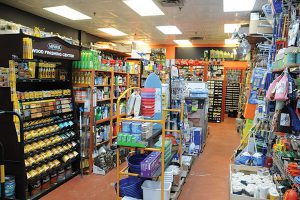
“When you’re dealing with a smaller footprint, you can’t have as many options,” he says. “I try to keep most of my stock on a shelf or on a hook, which means we’re just constantly restocking right off the truck.”
Schoen says his product mix often doesn’t line up with the seasons because customers demand a certain product all year long or because merchandising seasonal items becomes challenging in his small store.
One item that he keeps in stock throughout the year is white Christmas lights. “I deal with a lot of restaurants that light with white lights, so I always have those in stock.”
When it comes to merchandising, Schoen says they are always reorganizing the store to make room for the seasonal products he does sell.
“When the garden products come in to the store in February, I still need to keep snow shovels out, but they’re occupying the space in the front of the store where I keep plants and pots,” he says. “I’m constantly using space that was previously the space of another item. We don’t just need to move one item out of the way. At any given moment, some department is being downsized to make space for the new items, and that process never ends.”
Garber Hardware doesn’t maintain a large lawn and garden supply department because there isn’t demand for it in the city. Schoen says his customers are happy with his selection of terra cotta pots and soil.
“The kinds of hobbies people do on the weekends in the suburbs just don’t happen here in New York,” he says. “I have plenty of people who I see every week for plant food and things of that nature because they are basically horticulturists, but I don’t have to prepare for that spring rush like retailers in other areas of the country do.”
While customers may not have lawns or gardens in Manhattan, many of Garber Hardware’s customers have vacation homes outside the city.
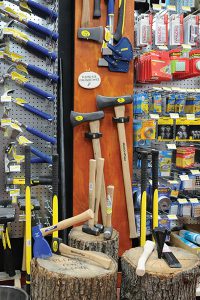
“New Yorkers leave every weekend in the summer, so while we may be slower on the weekend, we benefit during the week, because no one wants to shop for their vacation homes while they’re actually on vacation,” Schoen says.
Customers who are on their way out of the city stop in for items their vacation homes may need, and it’s not always only staples like lightbulbs. “We have a big collection of axes, because people need them to chop firewood at their weekend destinations,” Schoen says.
Similar to retailers in other markets, Garber Hardware benefits from big-weather events, like snowstorms, but only if they are consistent throughout the season.
“This winter, we sold one pallet of ice melt because we had one storm at the end of the season,” says Schoen. “I had that pallet on hand since October.”
Schoen keeps his product mix interesting by buying what stands out to him in his catalogs. He expects his customers will have the same kind of impulse reaction to those unexpected products.
“We stand out for having some esoteric stuff,” he says. “I would like to think that most people who spend more than a few minutes in the store walk out with something they didn’t plan to buy.”
One of the most unique impulse items that his customers can’t get enough of is horseshoes. He merchandises them on the service counter, and customers often call attention to them. “They all ask the same thing: ‘Do people really buy these?’ And I say, ‘That’s a fresh box. I sell 48 horseshoes a month.’”
In Support of Passion Projects
Schoen approaches employment quite differently from retailers in rural and suburban stores. Schoen says knowing at the start that the employees you bring in will eventually move on to something else means you will always get good people.
“I only want to hire people who I know I won’t get to keep,” he says. “The folks I hire are too good to stay with me long term. If you hire someone who is too good for you, they will make your space better.”
While Schoen seeks out high-quality employees and prefers to find people with a hardware background, he also focuses on creating an experience his employees can take with them to their next endeavors.
Opportunities for advancement in a small store like Schoen’s can be challenging. “I want an employee who will like working for us and will excel, but they’re going to take the experience from working in this store and apply it to bigger and better things,” he says. “I bring on people who are actors or artists or musicians, who already have something going on in their lives. They just need a few hours a week to bring in some money while they’re working on their passion project.”
Schoen says it’s nice if his hirees have some experience or knowledge in the industry, but the right person needs to know customer service. “It’s not just working in retail. It’s a little more demanding,” he says. “My customers want to be taken to the product, and they have questions about it, even if it’s just lightbulbs.”
Finding the right employee who matches up with the store’s needs can leave Schoen short-handed sometimes, but he says waiting for a good match is worth extra work on his part.
“I’d rather work a seven-day week for a few weeks and find the right person for the job who can meet customers’ expectations,” he says.
Schoen finds most of his employees through current or former employees or through word of mouth because they understand what kind of personalities make the right fit for the store.
Schoen found one of his employees through a long-time customer who no longer had enough work for all of her employees. Schoen hired him nearly immediately because he was familiar with the store as a former regular customer.
“He was already coming with such a great reference, so it was an easy hiring decision for me to make,” Schoen says.
Manhattan Mainstay
Schoen says the Greenwich Village store has a good amount of street credibility because it’s been in business for so long.
“If you read New York City local news and see a headline that mentions a venerable New York business, you know what it’s going to say before you even read the article: ‘Such and such business in Manhattan closing after 70 years because of this or that,’” Schoen says. “I take pride in going the opposite direction of that, and it’s super special after so many generations that we’ve been able to adapt to the constantly changing New York City landscape and residency.”
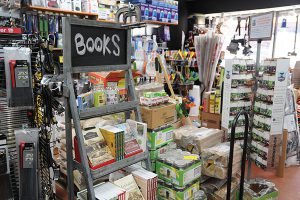
Schoen remembers just 30 years ago when stores like his were union shops with limited hours catering only to trades.
While Garber Hardware’s history is impressive by itself, Schoen takes cues on how he can maintain his success with a new audience using today’s tools.
“We’ve been talking about developing a new marketing strategy for the store,” he says. “We are pretty active on social media.”
Schoen uses social media to interact with the community online in a relaxed, casual way that reflects what people will experience in the stores. “I think we’re all hyperaware of how not relaxed social media is lately. I really wish social media was just pictures of people’s pets, kids and vacations.”
Garber Hardware uses social media to communicate sales and products, but it’s also used to reinforce that the store is a family-owned and -operated business.
“We are fully run as a family business, and if someone has a kid or someone is getting married, we might have to close the store for a few random days, and we are sure to share those changes on social media,” Schoen says.
The lighthearted atmosphere Schoen shares with followers on social media is not much different from what customers will find when they visit either Garber Hardware location.
“We’re serious businesspeople, but it’s never too serious, and social media is fun,” he says. “The most serious we get is when we’re giving friendly advice on regular home improvement projects.”
 Hardware Retailing The Industry's Source for Insights and Information
Hardware Retailing The Industry's Source for Insights and Information



